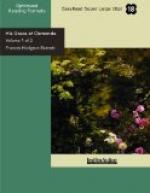“Dear one!” he said, kissing her hand more gravely; “dear one, God grant such sweetness may come to me—for indeed I want to love some woman dearly,” and the warm blood mounted to his cheek.
Often in their tender confidences they spoke of this fair one who was to crown his happy life, and one day, having returned from a brief visit in another county, as they sat together in the evening she broke forth with a little sigh in her sweet voice.
“Ah, Gerald,” she said, “I saw in Gloucestershire the loveliest strange creature—so lovely and so strange that she gave me an ache in the heart.”
“And why, sweet one?” he asked.
“Because I think she must be the most splendid beauteous thing in all the world—and she has been so ill used by Fate. How could the poor child save herself from ill? Her mother died when she was born; her father is a wicked blasphemous rioter. He has so brought her up that she has known no woman all her life, but has been his pastime and toy. From her babyhood she has been taught naught but evil. She is so strong and beautiful and wild that she is the talk of all the country. But, ah, Gerald, the look in her great eyes—her red young mouth—her wonderfulness! My heart stood still to see her. She hurt me so.”
My lord Marquess looked down upon the floor and his brow knit itself.
“’Twould hurt any tender soul to see her,” he said. “I am but a man—and I think ’twas rage I felt—that such a thing should be cast to ravening wolves.”
“You,” she cried, as if half alarmed; “you have seen her?”
“’Tis the beauty of Wildairs you speak of surely,” he answered; “and I have seen her once—and heard of her often.”
“Oh, Gerald,” said her Grace, “’tis cruel. If she had had a mother—if God had but been good to her—” she put her hand up to her mouth to check herself, in innocent dread of that her words implied. “Nay, nay,” she said, “if I would be a pious woman I must not dare to say such things. But oh! dearest one—if life had been fair to her, she—She is the one you might have loved and who would have worshipped such a man. It might have been—it might have been.”
His colour died away and left him pale—he felt it with a sudden sense of shock.
“It was not,” he said, hurriedly. “It was not—and she is but fourteen—and our lives lie far apart. I shall be in the field, or at the French or Spanish Courts. And were I on English soil I—I would keep away.”
His mother turned pale also. Being his mother she felt with him the beating of his blood—and his face had a strange look which she had never seen before. She rose and went to him.
“Yes, yes, you are right,” she exclaimed. “You could not—she could not—! And ’twould be best to keep away—to keep away. For if you loved her, ’twould drive you mad, and make you forget what you must be.”
He tried to smile, succeeding but poorly.




